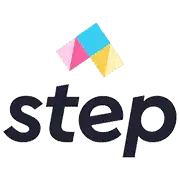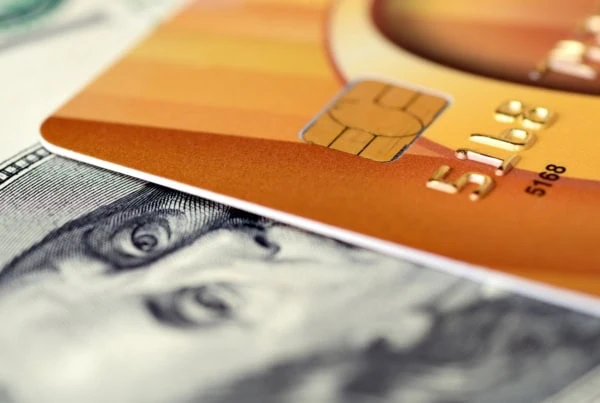While you can open a student checking account at any local bank or credit union, it can be useful to shop around to find the best option. To help you narrow down your choices, we’ve pulled together some of the best student checking accounts available.
These student bank accounts offer low or no fees, flexible balance requirements, FDIC insurance, and convenient features that will make managing your money easier—because let’s face it, you’ve got enough on your plate already with school.
Best Student Checking Accounts—Our Top Picks
|
Primary Rating:
4.0
|
Primary Rating:
4.9
|
Primary Rating:
4.2
|
|
Free (no monthly fees)*
|
Free (no monthly fees).
|
Free (no monthly fees).
|
Best Student Checking Accounts
1. Chase College Checking℠ (Best Student Account From a Major Bank)

- Available: Sign up here
Students starting or heading back to college in the fall could make campus life a little easier with Chase College Checking℠.
This account keeps more money in your pocket by charging no monthly service fee until graduation (or for five years, whichever comes first). After that, the monthly fee is only $12, and even then, it can be waived if you get direct deposits or have a daily balance of $5,000. Students also can withdraw cash fee-free from more than 15,000 Chase ATMs.
Chase’s mobile app simplifies money management and includes zero-liability fraud protection to get reimbursed for unauthorized debit card purchases. You can send money to friends via Zelle, you can monitor your money and set up account alerts through the Chase Mobile app, and you can enjoy other features, such as Autosave, free credit scores, and Chase Overdraft Assist℠, which allows you to avoid overdraft fees if you’re overdrawn by $50 or less (and gives you a day to get back under the threshold if you’re overdrawn by more than $50).
- Chase College Checking℠ provides free checking, mobile banking, and other financial tools to students enrolled in college or vocational, technical, or trade schools. Students enjoy zero-liability fraud protection, mobile app access, money transfers via Zelle®, and more.
- Zelle® lets you send money to (and receive money from) people and businesses you know and trust as long as they have an eligible account at a participating U.S. bank.
- Age requirement: 17-24
- Annual percentage yield (APY): None
- Minimum deposit: None
- Minimum balance required: None
- Special offer: Enjoy $100 as a new Chase checking customer when you open a Chase College Checking℠ account and complete 10 qualifying transactions** within 60 days of enrollment.
- Waived monthly fees*
- Mobile app
- Generous sign-up bonus
- Large network of physical branches
- 15,000-plus fee-free ATMs
- No APY
- Tight age restrictions
2. Axos Rewards Checking Account
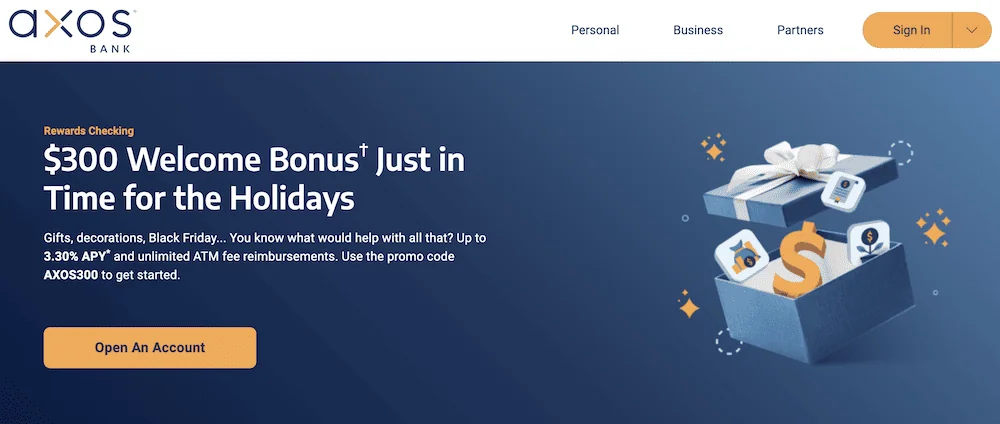
- Available: Sign up here
The Axos Rewards Checking Account is an excellent option for students who want flexible everyday spending and high-interest earnings in one place.
This checking account has no monthly maintenance fees, overdraft fees, or non-sufficient funds fees, and you will get reimbursed for all domestic ATM fees. Plus, you can earn a high annual percentage yield (APY)—especially when compared to other checking accounts—based on your spending, direct deposits, and other account activity.
Account holders get access to a mobile app with convenient features like online bill pay, a spend tracking tool, and the option to connect other financial accounts for a bird’s-eye view of all your money. Keep in mind that Axos is an online bank that doesn’t have any local branches in case you want an option for in-person service.
- Axos ONE is a bundled high-yield checking and savings product offering early paydays and competitive APY rates
- Savings Account: 4.86% APY*
- Checking Account: 0.51% APY*
- Age requirement: 18 or older
- Minimum deposit: None
- Minimum balance required: None
- Fee-free ATM Network: 95,000+ locations
- No monthly fees
- High APY for checking
- Mobile app
- Online bill pay
- Spend tracking
- Unlimited ATM reimbursements
- No physical branches
3. Current Checking Account
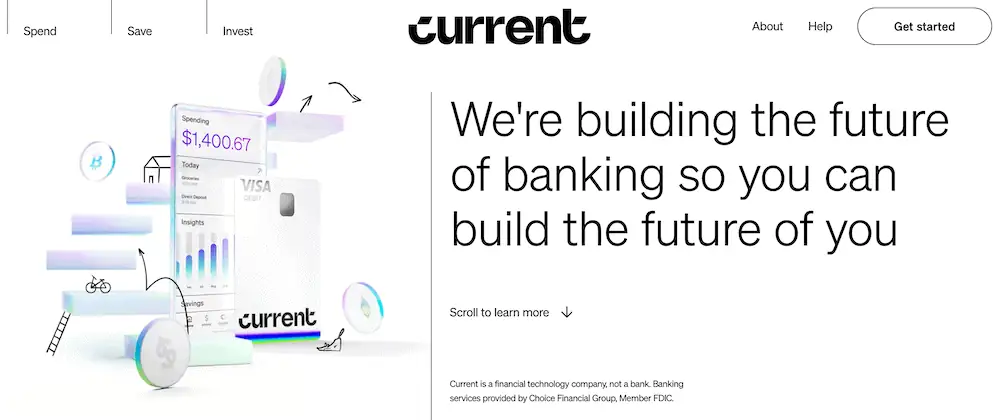
- Available: Sign up here
A Current checking account comes with a Visa debit card that helps college students build credit and earn points on everyday purchases. You can redeem points for cash back and put it toward your account balance to lower your monthly costs. There’s no minimum balance requirement, and you won’t have to pay overdraft fees, bank transfer fees, or in-network ATM fees.
You can pair your Current spending account with a savings account that offers an APY on up to $2,000 in each of your three Savings Pods. You can get a significantly boosted rate by receiving $200 or more in direct deposits every month. There’s also an option to round up debit card purchases to the nearest dollar and automatically deposit the difference into savings.
- Current is a financial technology platform that delivers not just traditional banking basics, but numerous features meant to simplify spending, streamline saving, and set users on the path toward more organized finances.
- Earn more with your money: Get up to 7x points from eligible purchases, and receive up to 4.00% APY on up to $2,000 in each of your three Savings Pods.*
- Savings Pods allow you to allocate savings toward different goals. Want to bolster your savings? Current allows you to round up purchases and have the overages funnel into your Savings Pods.
- View your spending habits, monitor your earnings, and create monthly budgets with Current's money management tools.
- Current also offers teen accounts! Parents can instantly transfer their money to their teen, automate allowance payments, view their child's earnings and spending history, receive notifications, assign chores, and even set spending limits.
- Free account (no monthly maintenance fees)
- Parental controls on teen accounts
- Get paid early on direct deposit paychecks
- Earn up to 7x points that can be redeemed for cash
- Up to 4.00% APY on Savings Pods
- Fee-free ATMs
- 24/7 email and live-chat support
- FDIC insurance
- High savings APY limited to first $2,000 in each Savings Pod
- No paired investment account
4. Step Banking
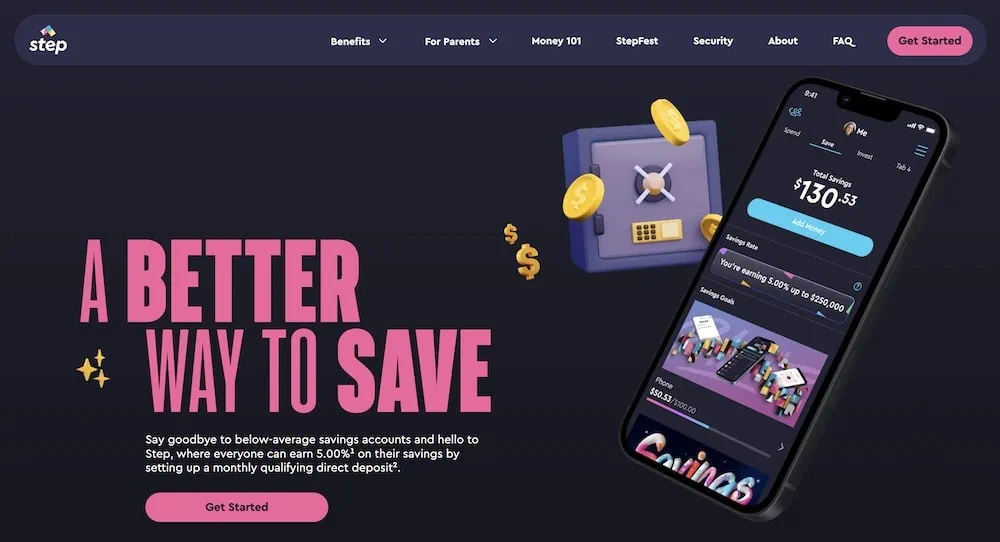
- Available: Sign up here
Unlike a traditional checking account, Step is an all-in-one financial platform that lets account holders do everything from tracking their spending to investing. You’ll need to be 18 to open an individual Step account, but if your parent opens a Step account, you can be added to theirs earlier than that.
Step offers the features you’d expect from a checking account, like spend tracking, but it also lets you do things like build your credit, buy fractional shares of your favorite stocks, and automatically add your spare change to a savings account. The credit-building feature can be especially useful, as working on your credit score early can open up opportunities for you later. For instance, with good credit, you’ll be able to get better rates on loans and insurance.
Overall, Step is a good choice for parents who want to help their teens learn about holistic money management and financial responsibility and students looking to build their credit, get a good yield on their savings, and possibly start investing. The opportunity to invest early can also be very beneficial from a learning and long-term growth perspective.
- Earn 5% annually on savings with Step, where you can save, spend, invest, and even build your credit history.
- Step offers a high yield on up to $250,000 stored in Savings Goals.* While the savings rate can change, Step will provide a 30-day notice before it does.
- Earn points that you can redeem for cash when you use your Step Visa Card at participating merchants.*
- Buy and sell fractional shares of stocks, ETFs, and Bitcoin for as low as $1.
- Send and receive money instantly, spend with Apple and Google Pay, and track your card's balance from the Step App.
- Banking services, provided by Evolve Bank & Trust, are FDIC-insured for up to $250,000.
- High yield on money held in Savings Goals
- Helps build credit
- Free investment account for stocks, ETFs, and Bitcoin
- Fractional investing for as low as $1
- FDIC insurance
- High-yield savings only available with qualifying monthly direct deposit*
- Can't directly deposit checks into a Step account
5. Chime Online Checking Account
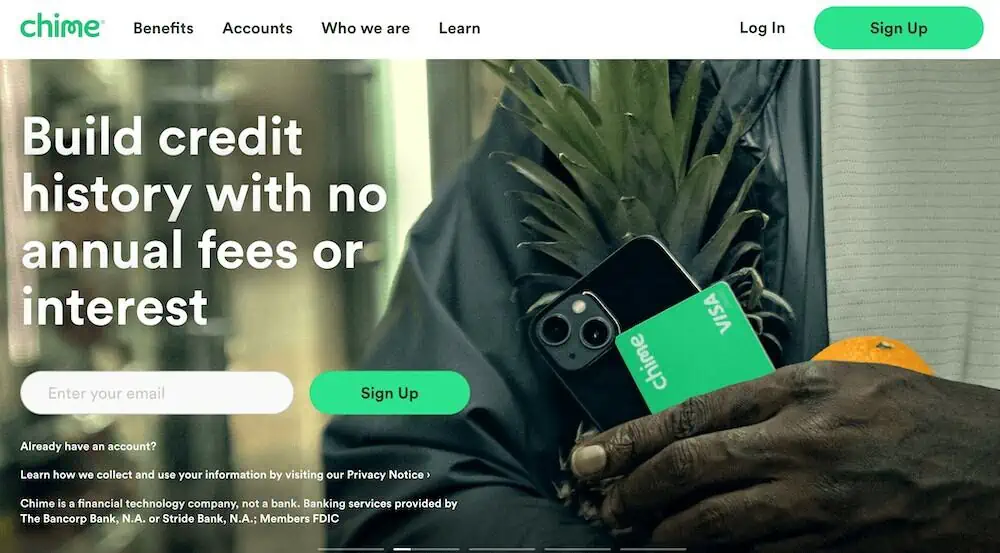
- Available: Sign up here
Chime is a financial technology company known for its broad network of 60,000 fee-free ATMs and zero monthly service fees. It offers a checking, savings, and secured credit card account, all of which can serve as a great starting point for student finances.
With a Chime checking account, you won’t ever be charged monthly, minimum-balance, or overdraft fees. Your debit card also comes with fraud protection and real-time alerts to keep your money safe.
While Chime doesn’t have all the bells and whistles some competitors offer, it’s a solid account with no unexpected fees. College students looking for a straightforward checking account with fee-free ATM access, Chime could be an option worth considering.
- Chime banking is a financial technology platform that charges no monthly, transaction, or overdraft fees, requires no minimum balance, and offers access to more than 60,000 fee-free ATMs.
- Build your credit with Chime's no-fee Visa secured credit card.
- High-yield savings account currently offers 2.00% APY and provides automated saving services.
- Chime's Save When You Spend feature automatically rounds up transactions to the nearest dollar and funnels those round-ups into the Automatic Savings Account app.
- Age requirement: 18 or older
- Access to 60,000-plus fee-free ATMs
- Round-ups
- Get paid early on direct deposit paychecks
- FDIC insurance
- No physical branches
- Must sign up for direct deposit to use mobile check deposit service
- Savings APY lower than typical high-yield savings account
6. Capital One MONEY
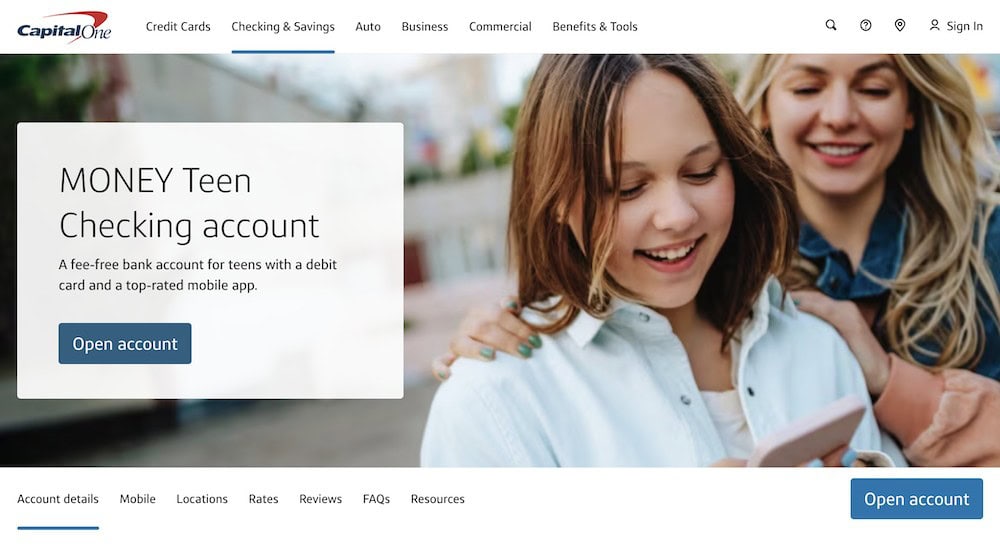
- Available: Read our review and sign up
- Price: Free (no monthly fees)
Capital One MONEY Teen Checking is one of Young and the Invested’s top choices for parents who want to financially empower their kids at an early age. Yes, this free checking account is predominantly aimed at teenagers, but it’s actually available to kids as young as 8 years old.
This joint checking account offers flexibility for kids and a touch of tranquility for parents. Kids get a Mastercard debit card that they can use at millions of merchants across the U.S., as well as in roughly 210 countries and territories worldwide. Your teen also enjoys access to one of the largest fee-free ATM networks among kids debit cards—more than 70,000+ Capital One, MoneyPass, and AllPoint machines. They can also send and receive money via Zelle, receive direct deposits from employers, and even cash paper checks by snapping a couple photos within the highly rated Capital One app.
Parents, meanwhile, can also pay their kids a regular allowance, or make one-time payments as gifts or rewards. They also can monitor their teens’ transactions, lock and unlock their child’s card, and control their kid’s access to (and transfer limits within) Zelle.
To learn more about the account, read our Capital One MONEY Teen Checking review. Or you can sign up today by clicking “Get Started” above.
- Capital One MONEY is a full-fledged money management account that comes with both a debit card and a highly rated mobile app.
- Boasts one of the largest nationwide fee-free ATM networks, which currently stands at more than 70,000 machines nationwide.
- Security features include monitoring tools and easy card lock/unlock.
- Age requirement: 8+ with a parent-sponsored account
- APY: 0.10%
- Minimum deposit: None
- Minimum balance required: None
- Free account and card
- Access to 70,000+ fee-free ATMs
- Access to Zelle
- Mobile check deposit
- Cash deposits
- Allowance
- Ability to migrate account to 360 Checking when minor becomes 18
- Sparse educational tools
- Few rewards or perks
7. Alliant Credit Union High-Rate Checking
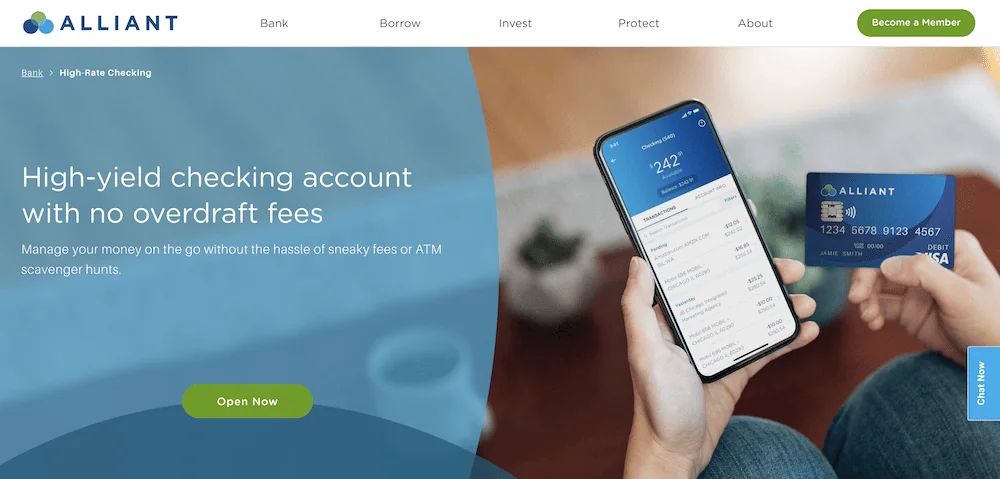
- Available: Sign up here
Alliant Credit Union has two checking account options: one for individuals over 18, and another account for teens between 13 and 17 years old. Both checking accounts offer a decent APY (much smaller than a high-yield savings account, much better than your average checking account) if you opt into electronic statements and have at least one direct deposit.
The main selling point for these student accounts is no sneaky fees. This means you won’t pay monthly maintenance fees or overdraft fees, and in addition to being able to access 80,000-plus fee-free ATMs, you will be reimbursed up to $20 per month for out-of-network ATM fees.
Alliant also offers a convenient mobile app so you can manage your money wherever you want. That includes receiving alerts and replacing lost or stolen cards.
- Alliant Credit Union High-Rate Checking offers a yield-bearing checking account with plenty of mobile features but no monthly, minimum-balance, or overdraft fees. (It also has a Teen Checking product with many of the same features, but also spending controls and parental monitoring.)
- Age requirement: 18 or older
- Annual percentage yield (APY): 0.25%
- Minimum deposit: $25
- Minimum balance required: None
- No monthly fees
- APY for checking
- Mobile app
- Bill pay
- 80,000-plus fee-free ATMs
- No physical branches
- Minimum deposit ($25) required
What Is a Student Checking Account?
As its name suggests, a student checking account is a bank account for high school or college students. Student accounts often have special perks, like rewards for making debit card purchases or an opportunity to earn interest on account balances. Many checking accounts don’t earn interest at all, so finding one with a generous annual percentage yield (APY) is pretty rare.
Why Should You Open a Student Checking Account?
Student checking accounts help develop financial responsibility. You can track and manage your own spending (sometimes with your parent’s help) to get a sense of budgeting for monthly bills.
Some student accounts even earn interest or have an optional high-yield savings account. This provides a balance between spending and saving for the future while watching your money grow.
Many of these accounts include debit cards with unlimited transactions and no monthly fees or minimum balance requirements. There are a few that have prepaid credit cards that can help college students build credit without the risk of going over a credit limit or paying high interest rates.
Mobile apps and online banking services are other popular features that can come with a student account so you can manage your money from anywhere.
What Do You Need to Open a Student Bank Account?
To open a student bank account, you need a valid school ID or proof of enrollment. Many banks and credit unions require you to be between the ages of 13 and 17 at account opening for a junior high/high school student, or 17 to 24 years old if it’s a college student checking account.
Student bank accounts designed for younger teens often require a parent or guardian as a joint account holder. Parents might also be able to implement certain spending controls for these accounts.
There might be a minimum deposit requirement, but it’s easy to find a bank that lets you open a student account without depositing funds. Most student checking accounts on this list don’t require a minimum deposit.
What Should You Look for in Student Bank Accounts?
There are plenty of U.S. bank student checking account options that all have different features and benefits. Here are some considerations to keep in mind when comparing the best student bank accounts.
Low (Or No) Minimum Balance Requirements
Ideally, you can spend your hard-earned money when you need it without the fear of getting charged for going below a certain balance. Fortunately, several of the options above have low to no minimum balance requirements. Some may require an initial deposit, though it’s generally a fairly small amount, around $25 or $50.
Some checking accounts on the market do have a minimum deposit requirement and a set limit for a minimum account balance, so be aware of this as you compare different options.
Competitive Annual Percentage Yield (APY)
The more interest you earn on your money while it simply sits in an account, the better—and with bank accounts, that comes in the form of an annual percentage yield (APY). Bank account interest rates vary, and a standard checking account may not earn interest at all. Compare interest-bearing checking account options to find one with a generous APY.
Multiple Bank Account Types (Checking Accounts and Savings Accounts)
Banking is easier when you have a savings account and a checking account with the same company. You can transfer funds between accounts, talk to one representative about multiple accounts, and more.
The most common student bank accounts are no-fee and high-interest checking and savings accounts. Some banks and credit unions offer a hybrid account (also called a money market account) that combines a checking account with the competitive interest rates of a savings account.
Debit Card Access
Having a debit card linked to your bank account at a bank or credit union is an essential feature. Debit cards provide access to funds held in your checking account for in-person payments and ATM withdrawals. Some checking accounts come with a Visa debit card that lets you make online purchases like a credit card.
Low/No Fees
Many of the banks discussed above have free student checking accounts with no monthly fees, overdraft fees, or ATM fees. Again, this isn’t the case with every checking account out there, so be mindful of this when comparing options.
Overdraft fees and monthly maintenance fees are fairly common. It’s also hard to find a bank account that doesn’t charge a foreign transaction fee. In some cases, banks will waive fees for certain charges if you maintain a minimum balance, receive direct deposits above a set amount, or meet other requirements.
Large ATM Network With Fee Reimbursement
If you plan to deposit or withdraw cash at some point, consider getting a student checking account from a bank with a large fee-free ATM network and/or fee reimbursement. That means ATM fees are reimbursed for tens of thousands of ATMs nationwide, not just your bank’s ATMs.
Online banks may have smaller ATM networks than traditional banks, so it’s worth looking at ATM availability before choosing a checking account. Also, check that your debit card has free ATMs to withdraw and deposit cash or the ability to reimburse you for bank ATM transactions.
FDIC/NCUA Coverage
Make keeping your money safe a top priority. It’s standard for accounts to be insured by the Federal Deposit Insurance Commission (FDIC) or National Credit Union Administration (NCUA) up to $250,000 per depositor for each account ownership category.
Don’t bank with anyone who doesn’t offer this insurance. That’s a major red flag that your deposits may not be safe if the company defaults.
Rewards Programs
Many banks have rewards programs that don’t require any extra effort on your part. You can get rewards for debit card purchases, direct deposits, and other banking activities. Rewards often include cash back you can use to offset future costs or special welcome bonuses for opening a new account.
Direct Deposit
Direct deposit is easier than checks, and some banks can help you get paid faster. The time it takes to process direct deposit funds depends on the bank, but it’s usually 1 to 2 early. Ask your employer about setting up direct deposit once you’ve opened a new checking account.
No Overdraft Fees/Free Overdraft Protection
Depending on the order in which your bank transactions clear, you could end up with a negative balance that might result in an overdraft fee. These fees can add up, especially if you make multiple purchases without realizing you’ve overdrawn your account.
Some banks and credit unions don’t charge overdraft or nonsufficient funds (NSF) fees at all, so be sure to research or ask about these costs before opening a new account.
Mobile App
Mobile apps are a standard checking account feature with most banks. You can open a bank account, receive direct deposit funds, transfer money, pay bills, find fee-free ATMs, and much more—all from a mobile app.
Mobile apps make it easy to track your spending and see the balance of funds in your account at all times. Other helpful features for managing your finances include budget planners, automatic savings programs, and credit score tools.
Other Banking Services Provided
Some banks and financial apps offer extra banking services and other financial support for high school and college students.
For instance, if you struggle to save money, using round-ups can help. Round-ups automatically round your purchases to the nearest dollar and add the change to your savings. Savings “pods” (also sometimes “goals” or other terms) are another useful feature that lets you put money toward specific goals. These are usually tied to a savings account with a higher APY.
Mobile Check Deposit
While you can deposit checks at a local branch or ATM, mobile check deposit lets you deposit paper checks from the comfort of your home, whether it’s your parents’ house or an off-campus apartment.
For instance, if you receive a birthday card in the mail with a check from your grandparents, you can use mobile check deposit to take a photo of the check with your phone and add the funds to your account online.
Getting a Credit Card
A student checking account can be a great first step in managing your money and a pathway to getting a credit card. Many student credit cards are secured options, requiring a small, refundable security deposit as collateral on the card.
Card issuers generally report payment history on secured cards to the three major credit bureaus, which can help you build credit when you use your card responsibly.
Online Bill Pay
If you’re living on your own or at home and paying certain bills, online bill pay is a very helpful tool. With online and mobile banking, you can set up automatic monthly payments to your cell phone provider or car insurance company so you never pay late. Online bill pay also lets you pay for one-off costs like the occasional medical bill after a doctor’s visit.
Free Payment Transfers (e.g., Zelle or ChasePay)
Many student checking accounts also have free payment transfers. For instance, eligible Chase checking accounts can use Zelle to send and receive money. This makes it easy to split the bill with friends when dining out or cover your portion of the rent for your off-campus apartment.
What Happens When You Stop Being a Student?
Once you’re no longer a high school or college student, many banks let you convert your student bank account to a different type of checking account. Since financial institutions want to retain account holders as much as possible, the process of converting to a new account is usually pretty quick and simple.
Does Opening a Bank Account Affect Your Credit Score?
Generally, opening a bank account won’t affect your credit score. Banks and credit unions won’t do a hard credit check for a new checking account. They also won’t report your incoming and outgoing transactions to the three major credit bureaus: Equifax, Experian, and TransUnion.
That said, if you miss monthly bill payments or pay late, your creditor will likely report that information to credit bureaus. This could negatively impact your credit score, making it trickier to get approved for a credit card or loan in the future.
Making all your monthly payments in full and on time will generate a positive payment history that can boost your credit score over time.
Is It Worth Getting a Student Bank Account?
Getting a student bank account can absolutely be worth it, whether you’re in high school or college. These accounts are a stepping stone toward your financial independence, and they serve as a valuable learning tool to help you manage money. Not to mention that some accounts earn rewards for everyday spending, so you’re essentially getting a special bonus for purchases you’d be making anyway.
While opening a student bank account can be a smart move, it’s essential to choose the right one. The best student checking account will have minimal or no fees, a competitive APY, an accessible ATM network, a mobile app for online banking, and other convenient features that make it easy to take control of your finances.
Disclaimers
Axos Bank Cash Back Checking
¹ Earn up to 1.00% cash back on signature-based transaction purchases. Earn up to $2,000.00 per month in cash back on your signature-based transactions. Maintain a $1,500.00 average daily collected balance to earn 1.00% cash back on signature-based transaction purchases. If your average daily collected balance falls below $1,500 you will earn .50% in cash back for the month.






